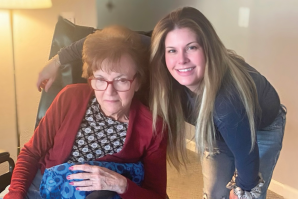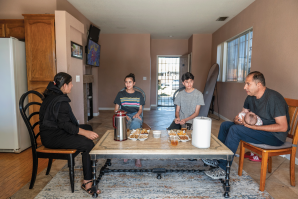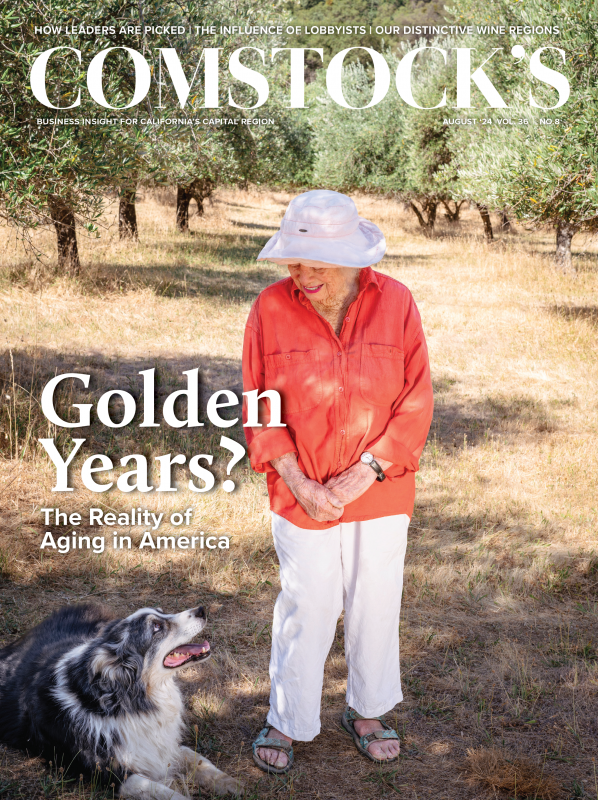Chris Micheli starts his day early. The principal and owner of lobbying firm Snodgrass & Micheli is legendary in Sacramento for his prolific work ethic. In addition to his nearly three decades of lobbying efforts, he’s also the author of a dozen books and an adjunct professor for his alma mater, University of the Pacific’s McGeorge School of Law, and UC Davis’ King Hall.
The bespectacled sole practitioner typically rises at 5:30 a.m., laces up his running shoes and gets in a quick run with Milo, the family’s labradoodle puppy. Next, he scans the local and national newspapers and legislative sites and then dispatches a flurry of emails to various followers and stakeholders on state policy and hot issues. The voracious reader is also known for his posts about legislative updates and insights on his blog, social media and YouTube channel. He has more than 4,000 followers on LinkedIn alone.
The traditionalist then dons a suit and tie and leaves his Sacramento suburban home for the 20-minute trip to his downtown office. He chats with clients or colleagues on the drive, then heads to the Capitol or legislative swing space — temporary digs while the new state office building is under construction — for hearings or meetings. These typically conclude by 4 p.m. to 5 p.m., then the evening work begins — fundraising events and networking. The husband and father of three arrives home around 7 p.m. and enjoys a little family time before getting back to work reading and writing, finally calling it quits around 11 p.m.
“Lobbying is a relationship business, so having a network of individuals who know you and your clients and see you as a trusted and respected advisor is critically important,” says Micheli.
Lobbyists who spend their day impacting California legislation and regulatory decisions work long, frenetic days — no two look alike. They come from a myriad of different backgrounds: law, political science, government affairs and communications, with outliers in engineering, psychology and education. But most share similar character traits: good analytical, networking, relationship and communication skills, with a side of political savvy and a desire to get the best possible outcome for their clients, even when politics prevail.
What lobbyists do
California lobbyists must register with the Secretary of State if they spend at least one-third of their time in influential direct communication with state-level officials or their staff. In 2023-2024, that number was more than 2,100. California is one of only 10 states that has a full-time professional legislature, and last year, companies and industries spent a record high $480 million on lobbying efforts in the state.
Lobbyists secure new clients in a variety of ways. A request for proposal (or RFP process) is utilized for public sector clients, but private sector clients are procured almost exclusively through word-of-mouth. “They are almost always referrals from current or former clients,” says Micheli.
Lobbyists’ loyalties ultimately lie with their clients, and they are paid to represent their interests. That often entails regularly hashing it out with supporters and opponents and seeking a compromising middle ground. Despite the stigma, “everyone is represented by a lobbyist, directly or indirectly. I have yet to meet a constituent or group who is not represented by a lobbyist, whether they know it or not,” says Ambar Carlisle Salgueiro, director of the Jesse M. Unruh Assembly Fellowship Program, part of the nationally recognized Capital Fellows Programs that place fellows in each branch of state government, another conduit for becoming a lobbyist.
Legislative bills rarely have unanimous support; they require a great deal of compromise to appease both sides, which is where lobbyists ply their craft. Kalyn Dean, vice president of state advocacy for the California Hospital Association, cites AB392 as an example. The bill, known as the police use-of-force, was proposed by advocates after the death of Stephon Clark, an unarmed Black man killed by Sacramento police. Dean was working at PolicyLink at the time, a nonprofit focused on economic and social equity. The criminal justice major originally intended to be a police officer but switched to advocacy and social justice work to impact the system.
“This bill was a multi-year effort and involved one of the largest public advocacy and mobilization efforts I’ve ever seen, to date,” she recalls.
The bill was referred to the Assembly and Senate Public Safety Committees, and hundreds of people came to Sacramento to voice their views. “Each time, the lines of people were so long they couldn’t fit along the sides and back of the hearing room, so the sergeants had to create queues into the hallways and let people into the room only five to 10 at a time,” she recalls.
Advocates wanted more stringent requirements and consequences; opponents favored more training. “It was a tough bill to work on; it had so many turns, and it was difficult to move through, which is why it took several attempts to get to the governor’s desk,” she says. Intense public and private negotiations with elected officials, law enforcement, community members and other stakeholder groups influenced the language of the final bill, which required compromise on both sides.
The bill was signed into law by Gov. Gavin Newsom in August
2019.
In addition to her current role with the hospital association,
Dean also serves as a lobbyist liaison with the California
Legislative Black Staff Association and recently helped organize
a gala to raise money for an inaugural internship program.
“People showed up in old Hollywood-themed attire, and we were
able to raise more than $40,000 to create an internship pipeline
for more young Black staff to enter the Capitol,” she says.
Chris Micheli is the principal and owner of Sacramento lobbying
firm Snodgrass & Micheli. He’s known for his prolific work ethic,
having authored a dozen books and also working as a law
professor.

One of the gala attendees was Lawrence Gayden, policy director for the California Manufacturers & Technology Association, which represents over 400 businesses in the state’s manufacturing, processing and technology-based industries. Known for his fashion-nimble approach to the Sacramento heat, he often sports a business-casual polo when not meeting with legislative members or testifying before committees. At the gala, he arrived wearing a faux fur stole. “I can doll it up when I need to,” he laughs.
The Oakland native, who graduated with an English degree from Sacramento State, originally considered accounting and teaching as professions but learned about the lobbying world from mentor Kristin Beard King, founding partner with woman-owned lobbying firm Political Solutions in Sacramento. She offered the young college grad an internship in the summer of 2019.
“Based on my skill set and my sensibilities, she thought that I might be interested in the field,” he says. Beard King was right. Gayden’s hustle and hard work helped, as did his background in English on the critical thinking, reading and analyzing side, but he does acknowledge that there was a steep learning curve. “I’ve been in this game for five years, but some of the folks I work with have 20-plus years of experience and have seen various iterations of bills that come across and understand the context and history of things. That’s where I have to catch up and learn the rest. But I think hustle and staying nimble can close that gap in a lot of ways.”
Gayden handles CMTA’s labor, economic development, tax and workforce policies and is focused on legislation he says is critical to its members, including advocating for a full sales and use tax exemption for California manufacturers. Forty-four other states offer the full exemption, but California does not, requiring manufacturers to pay a tax on most manufacturing equipment. “We are dealing with other states that have these incentives in place that are actively trying to poach our business,” Gayden explains. “We want to work to codify what we can to make the business structure a little friendlier in California.”
Gayden and the CMTA are currently working on their third iteration of the bill. “Part of lobbying is persistence,” Gayden says. “Just because a bill doesn’t pass the first time, doesn’t mean you give up. You just keep refining and making it as fiscally appropriate as possible, while still keeping the intent.” The current version, AB52, is making its way through the legislative process.
The fast-paced world of lobbyists
Silvio Ferrari, principal with Axiom Advisors, has an engineering and sustainability background and fell into the lobbying field by accident. While working with a small homebuilder in Placer County, a friend suggested he consider the lobbying field. The California Building Industry Association was looking for a legislative advocate and staff engineer, and Ferrari fit the bill. He says he regularly uses his engineering education and field training in homebuilding to lobby on behalf of his clients, particularly around housing.
“It’s such an important issue for California to tackle right now, but it’s also a very hard issue to tackle because of the sensitivities of the state wanting to tell locals how to plan and what to plan for.” To stay current, he makes the rounds and does the work of checking in with people to be well prepared. “So much of our job is trying to expect the unexpected and know how people are thinking, and you can’t do that if you aren’t regularly checking in.”
That also means staying flexible in the fast-paced lobbying world, which can change day-to-day. “You do your best to prepare the evening before, and then you realize so many things popped up in real time, you had to whack-a-mole those, and you didn’t even get to your original 10 things,” laughs Ferrari.
Some days, he can crisscross between his office and the Capitol and legislative offices half a dozen times or more, making rounds, meeting with legislators and staff, appearing in legislative committees, testifying, talking with appointed officials and their staff, and working with clients and colleagues on reading, analyzing and writing in support and opposition of bills and regulations. “There really is no typical day,” Ferrari says. “Every day looks a little different.”
The level of discipline and organization required to meet the hard deadlines on the legislative calendar can demand long hours. Micheli admits he typically works 11 to 12 hours a day, plus a fair amount on the weekends during the legislative session, which runs from January through August. On the last day of the legislative session before the month-long summer recess, Micheli didn’t get home until 10:30 pm.
Despite the grueling pace, the lobbyists talk more about the upside of their work than the downside, but acknowledge that like every job, it has its shortcomings. “As much as I wish every legislative or regulatory measure were decided solely on policy grounds, there are a myriad of other influences on public policy decisions, including fiscal concerns and politics. Lobbyists operate in an inherently political arena, so it would be foolish to think that politics don’t enter into the equation,” says Micheli.
Ferrari expresses a similar sentiment, noting there is no perfect industry or perfect world, and sometimes politics wins, but “I do think when you sign up to represent a client, you work your tail off to give them the best outcome you can. You have to have line of sight into what the outcome is going to be, so you can be prepared.”
There is also a certain amount of pride in the profession,
especially when the outcome is tangible. “There’s something about
rolling up your sleeves and really working together on a shared
issue and then celebrating the wins and mourning the losses,”
says Dean. “It’s rewarding when you can look back at the end of a
legislative session — and look back at the bills that got passed
and what’s being signed into law — and know you had a part in
it.”
Recommended For You

When the Sun Sets on the Golden Years
The hardship and high cost of caring for a loved one in decline
For eight weeks in the summer of 2023, Laurie Watkins took leave from work to be her mother’s live-in caregiver. She had joined what is often referred to as the sandwich generation — those who are caring for both their children and their aging parents.

Sleepy Suburbs? No Way
These Capital Region cities are buzzing with energy and ambition
A generation ago, Sacramento was the undisputed king of commerce and culture in our region. But the once-quiet suburbs are growing up fast. In fact, thanks to years of quiet community building, the edge cities are leading the way in defining the modern Capital Region.

The Changemakers
The people who’ve shaped the Capital Region over the past decade
The Capital Region has seen a stunning metamorphosis over the past decade. These changes didn’t happen on their own; they occurred due to the work and vision of a range of notable people, from developers and public officials to sports executives and innovators.

The Great Migration
From immigrants fleeing their countries to Bay Area residents escaping high prices, the culture of the Capital Region is changing
Just under 2.4 million people live in the Sacramento-Roseville-Folsom metropolitan area, an increase of roughly a quarter since the turn of the century.

Building the Future
Veteran architects are essential in mentoring young, emerging designers
The field of architecture is changing, and technology is playing a central role, but it’s not the only element that’s shifting: so is the expectation of what young and emerging professionals are looking for in an architectural job.




